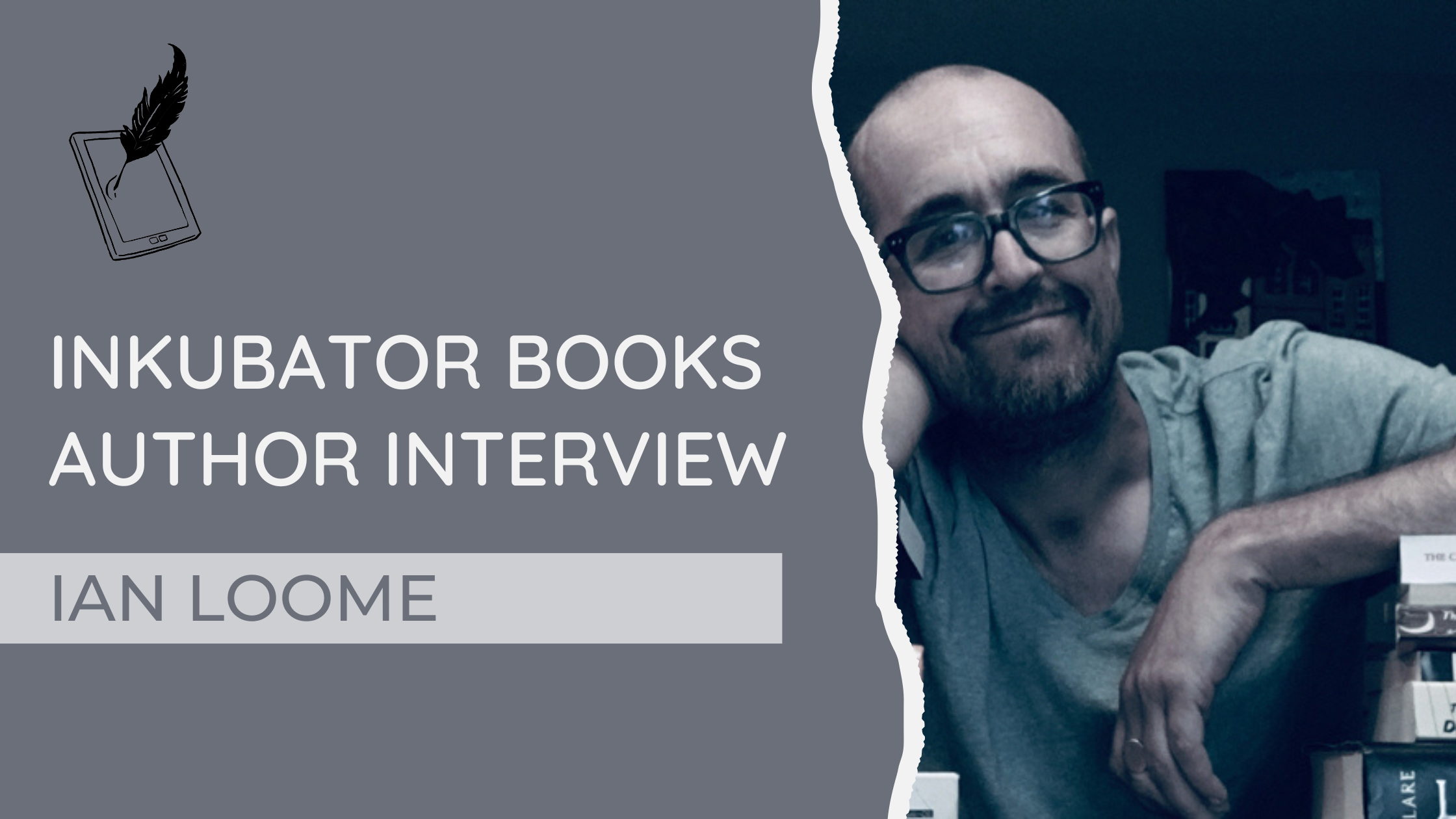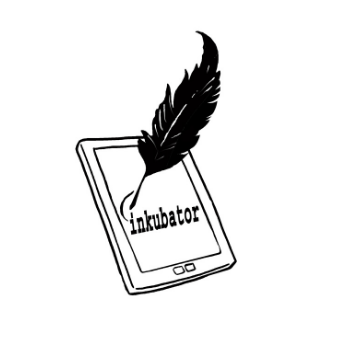Inkubator Books: When did you start writing?
Ian Loome: I wrote my first short story at age two, although it was barely legible, let alone well-structured. I’m neurodiverse and could read at an advanced level at age three, so I got an early start. It was the first of my Leo the Lion series, which ran until I was about eight, on any old loose paper, usually in crayon, with accompanying illustrations. Most were never shown to anyone, because I had the sense, even then, that this was more difficult than it looks. But Leo did okay, and did, in fact, end up as King of the Jungle.
IB: What does a typical day of writing look like for you?
IL: I get up later than intended because I stayed up later than intended, usually for no better reason than an old repeat of 8 Out of 10 Cats. I spend the first two hours of my day feeding the pets, making breakfast and reading the paper. I then lose another half-hour to an hour on Reddit or Wikipedia doing research on things that interest me but will likely never be used. I then start writing, half-an hour past my intended start. I’ll do two hours straight, generally, without looking up. Then I climb stairs for fifteen minutes to keep my legs healthy, as I’m getting older. Then it’s lunch, which takes about an hour, and a walk for the dog, which takes about twenty minutes. Then it’s two-to-three more straight hours of writing. If I’m working on more than one book, I’ll take a few hours off, have dinner, watch a show or two, then write for another hour or two before bed. But… having worked right until day’s end, I will be unsatisfied with my time off and will stay up an hour too late, watching panels shows.
IB: Do you base your characters off people you know or are they all the product of your imagination?
IL: Mostly just imagination. I think most writers use archetypes from real life and fiction in probably equal measure, but I don’t usually have someone particular in mind.
IB: What’s the most difficult part of your writing process?
IL: The research. I have good editors, so if there’s a plot hole, they’re usually going to spot it. But research takes a lot of time, because I strive for accuracy, particularly in locations. If I describe a location in one of my books, you can usually find it on Google Earth and it’ll be pretty much as described, sometimes specifically so. I rarely make one up completely; it’s usually similar to something actually on the map. Similarly, weapons, local slang, aphorisms and expressions, and avoiding using anyone real all require research throughout the writing process.
IB: What comes first for you – plot or characters?
IL: Plot. I know generally who I want each character to be from how they fit into the story. Breathing life into them comes later, to give them a sense of belonging to that place and time.
IB: Which of your books is your favorite? Why?
IL: I have three. The first is Quinn Gets Wise, the 12th book in my Liam Quinn Mysteries series. I like writing comedy, generally, but don’t get many chances. And I decided to be straight-up tongue-in-cheek for much of that book. I think it worked, generally. It made Amazon’s satire charts for a while and got some good reaction from people who like their murder mysteries more funny and less bloody. The second is Code Red, the first book in the Bob Singleton series, because I took my time with it and it really seemed to click with readers. And the third is The Café Girl, a noir thriller I wrote about a sociopathic policeman in World War Two Paris. I probably should’ve mailed it out, as it again made Amazon’s historical fiction charts for a couple of weeks, but I didn’t have the confidence a decade ago. Kindle readers didn’t really enjoy a psychological study of a sociopathic law enforcement officer getting his comeuppance with a twist, and it got a lot of ‘huh?’ reviews from people who expected him to become a good guy. But for the most part, it was the story I wanted to write.
IB: What are you doing when you aren’t writing?
IL: I play blues guitar for 30 minutes to an hour most evenings. I try to get an hour of reading in daily but sometimes it’s every other day. I watch a lot of streaming shows, walk the dog with my partner, that sort of thing. Spectacularly unexciting, really.
IB: What does your writing space look like?
IL: I have a desk in front of floor-to-ceiling windows looking out from our living room to the backyard. It’s nothing fancy, a keyboard, a monitor, two speakers, a Mac Mini I occasionally wish would burst into flames, then rise, Phoenix-like, as the PC I should’ve bought.
IB: Have you ever traveled to research for a book?
IL: Nope. I have, however, used elements from prior trips overseas in stories after the fact. I’ve got a Bob story that takes place mostly overseas that I’m knocking around and might take a research trip.
IB: What genres do you like to read? Who are some of your favorite authors?
IL: Mostly historical thrillers and sci fi, the odd action novel. Anything by Elmore Leonard or Ken Follett. My favorite literary authors are John Steinbeck and William Styron.
IB: How do you come up with names for your characters?
IL: If they have a particular ethnic extraction, I first look up lists of the hundred most common names from that country. If it’s a character in the UK or US I tend to think the names up, then check to make sure they’re realistic. Usually, if there aren’t enough for it to be something people would be unquestioning of, I’ll amend it slightly later in the process. I have a foible in which I sometimes unconsciously use the same first letter for multiple characters’ surnames, so I have to watch that.
IB: What was your favorite childhood book?
IL: Tough question. From age six to my early 20s, I read three-to-five books per week, and I’ve never really bothered to consider which were most impactful. Possibly… The Boy Who Invented the Bubble Gun by Paul Gallico, as I identified with the hero, Julian, and his sense of isolation. Despite it being utterly hated by many people, The Catcher in the Rye would be right up there as well. I read it seven times in a row as an 11-year-old neurodiverse kid stuck at a boarding school, because I identified with Holden’s bitter, cynical view of the world following the death of his brother (something young readers tend to miss, leaving them thinking he’s just a jerk).
IB: Have you ever abandoned a book you were writing? How did you know it was the right thing to do?
IL: Oh, tons. I have probably a dozen fully written books, or close to, that I’ve never published. Dozens of other with chunks written. If it’s not there, or it’s being forced, or I find myself trying to finish something just to finish it, even though I have no faith in it, I usually chuck it into the … well, not the ‘abandoned’ bin, but the “maybe I’ll get back to it” folder. Add in a few scripts to that, and a few non-fiction books as well.
IB: Do you have any tips for first-time authors?
IL: Set a daily word target, do it every day, and stick to a well-plotted plan. Finishing a book takes perseverance, not skill. That’s supposed to come later, on the second draft. Inspiration and perspiration are two very different things; the former usually comes when you’re relaxed and thinking about other things, so a second draft is essential.
IB: Who inspires you?
IL: Anyone purely altruistic, anyone who doesn’t quit when trying to better themselves. I’ve faced a lot of social challenges from my condition, but compared to so many people in this world my life is very fortunate. I try to be inspired by the many people who are always trying harder to do and get better.
IB: If you could eliminate one thing from your daily life, what would it be?
IL: ADHD. Part of my neurodiversity, unfortunately. Even with fairly strong medication it is a constant distraction, irritant and undermining factor. It has dramatic consequences for how I form and retain memories, making the natural recall of anything positive an effort, and interferes with emotional signaling, making relationships with others difficult due to moments of insensitivity.
IB: Do you have any pets?
IL: Three cats, one dog. We’ve had a heartbreaking few years of elderly pets passing. As little as five years ago, it was three dogs and five cats.
IB: How do you approach your genre in a unique way?
IL: I don’t really try to do anything specific. I have a story in mind, I plot it out, I write it. I can write in different styles and do so depending on genre and intent. With Bob, I generally try to heed Elmore Leonard’s advice to write as much as you need to inform the reader, rather than trying to paint every detail. People have their own images in mind as they read, and I try to respect and work with that.
IB: How do you manage the “whodunit” aspects of your story as far as clues and revelations? Do you outline?
IL: Oh, completely! In action stories like the Rogue Warrior books I try to have a twist or two to surprise at the end, and to drip out the related clues and details rather than using exposition. In my detective novels, it’s a different kettle of fish; there are certain reader expectations, like red-herrings and false suspects, that are required and that require planning parallel story arcs for the side characters. That can get quite detailed, but the trick generally is to make it seem as uncomplicated and obvious at the ‘reveal’ as possible; I really want the reader to say “well why didn’t I see that?” because if they looked closely enough, they’d know who the bad guy was before getting there. It’s not easy and I don’t always nail it.
IB: How do you relax?
IL: I have Aspergers. Compared to normal people, I’m always relaxed, unless I’m being forced into a large social gathering.
IB: Who are your first readers when you write a new book?
IL: My editors. I don’t let family or friends read my work before publishing (or get them free copies). Support your artistic family with cash, damn it. They’ll need it at some point.
IB: What’s one thing you wish your readers knew about you?
IL: That I appreciate that they like the books and buy them. Making a living by entertaining people is very gratifying.
IB: Which do you enjoy writing more: dialogue or internal thoughts?
IL: No preference whatsoever. I use both, so we stick the longer inner monologue stuff into first-person italics to keep the flow clear. My books are very dialogue-heavy because it’s natural.
Thanks to Ian for sitting down with us today.
Want to read Ian’s books? Check out his titles on Amazon.
You can find Ian at the following places:
Website: www.ianloome.com
Email: ian@ianloome.com

